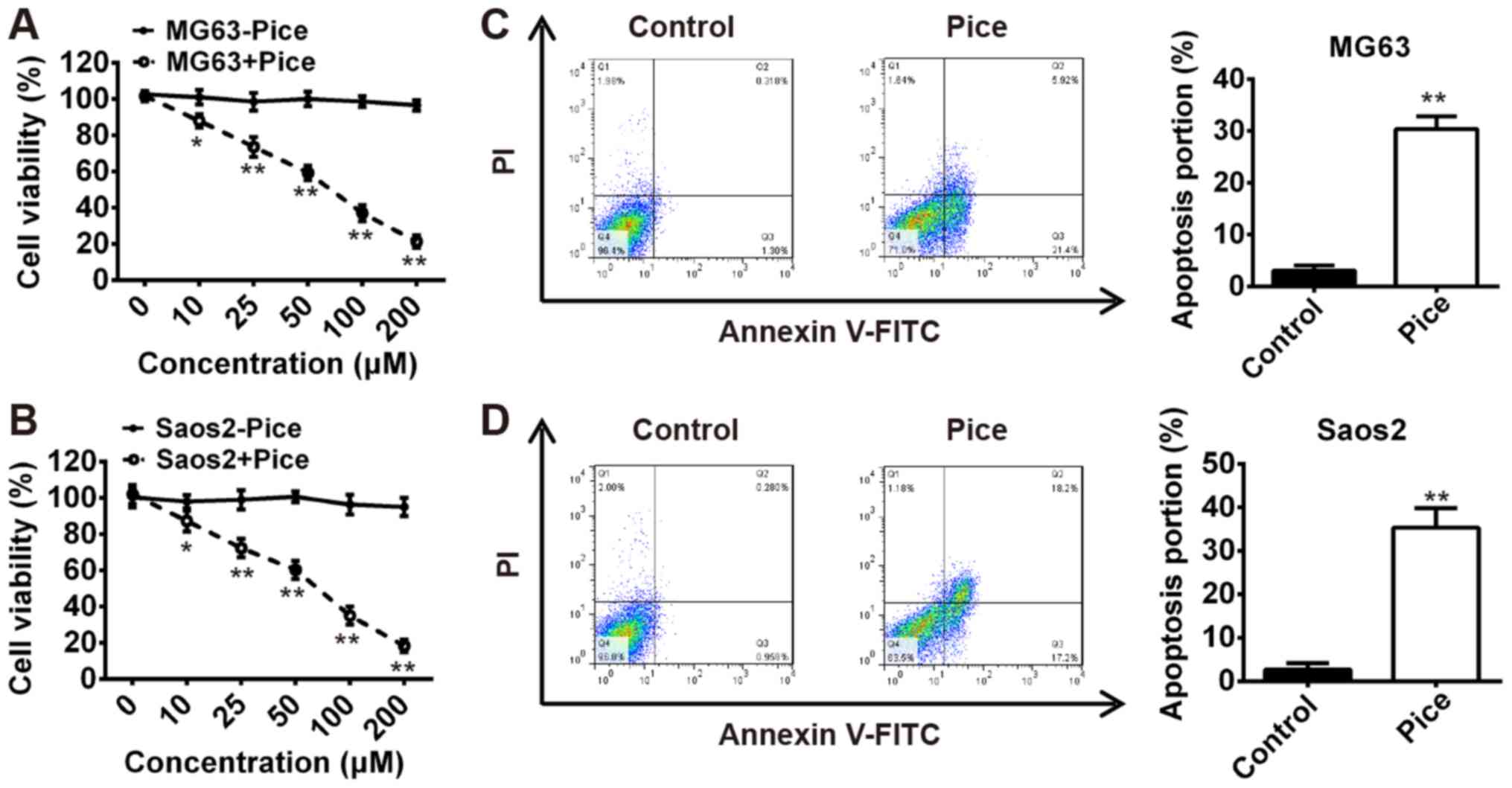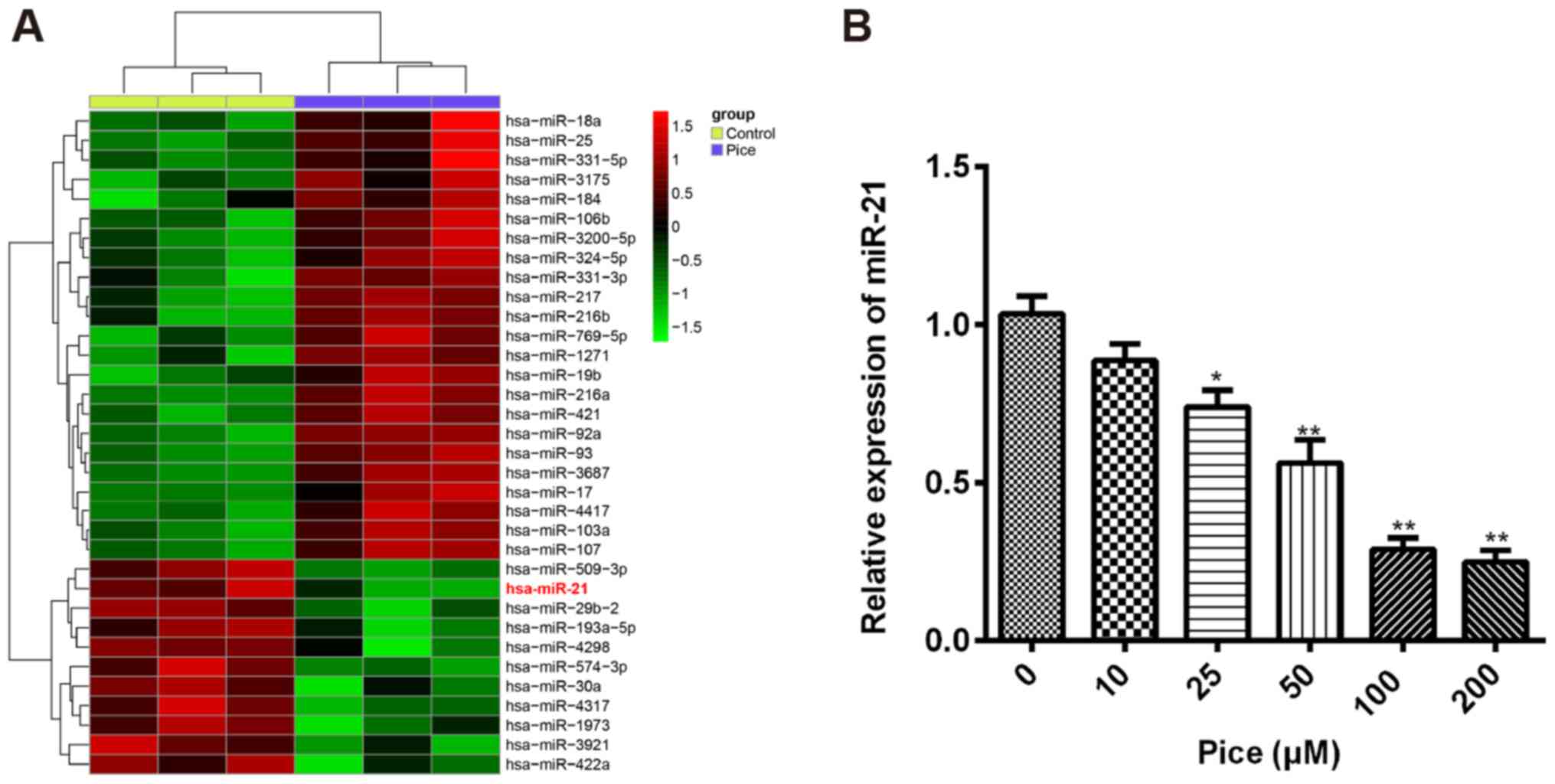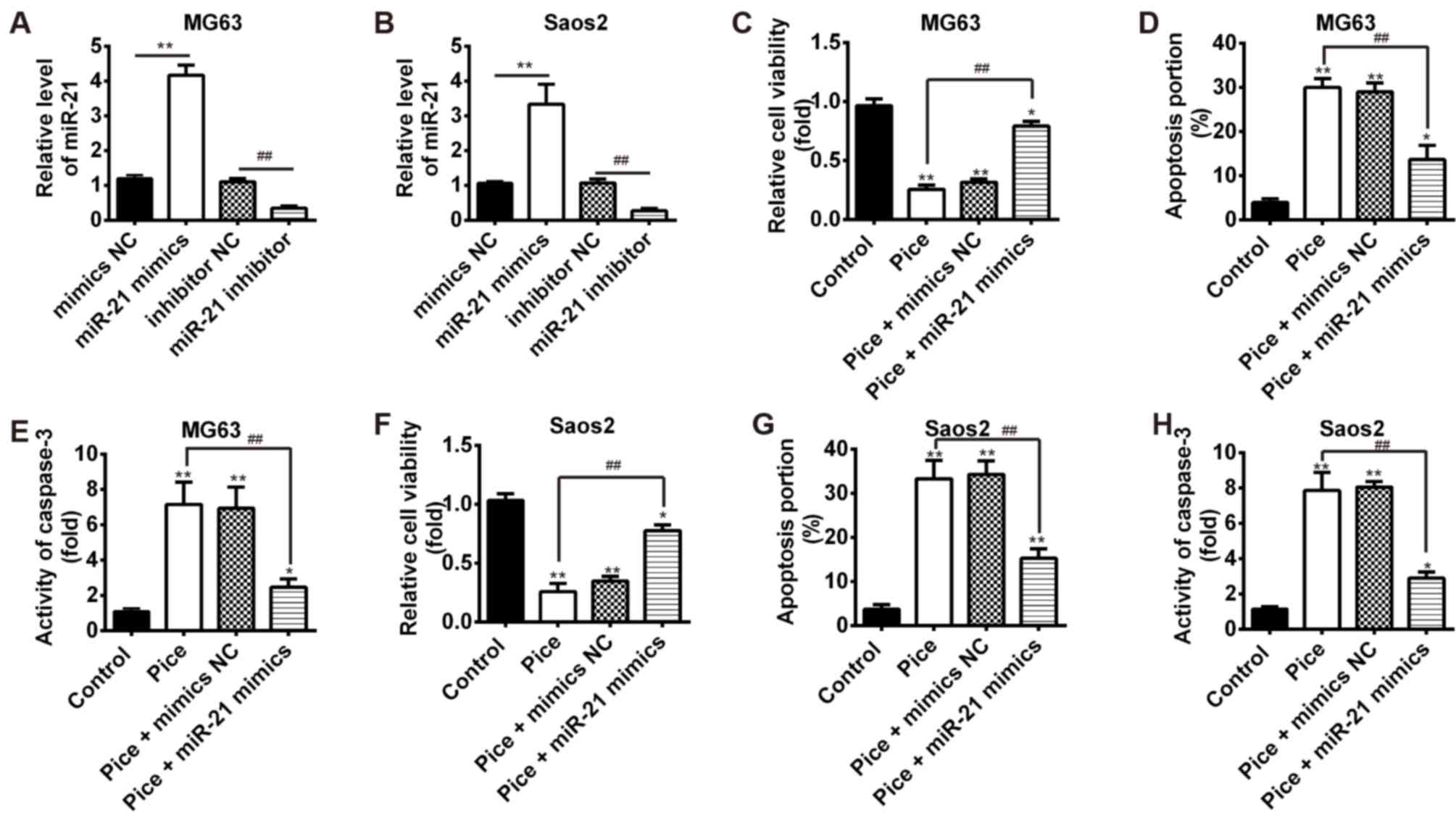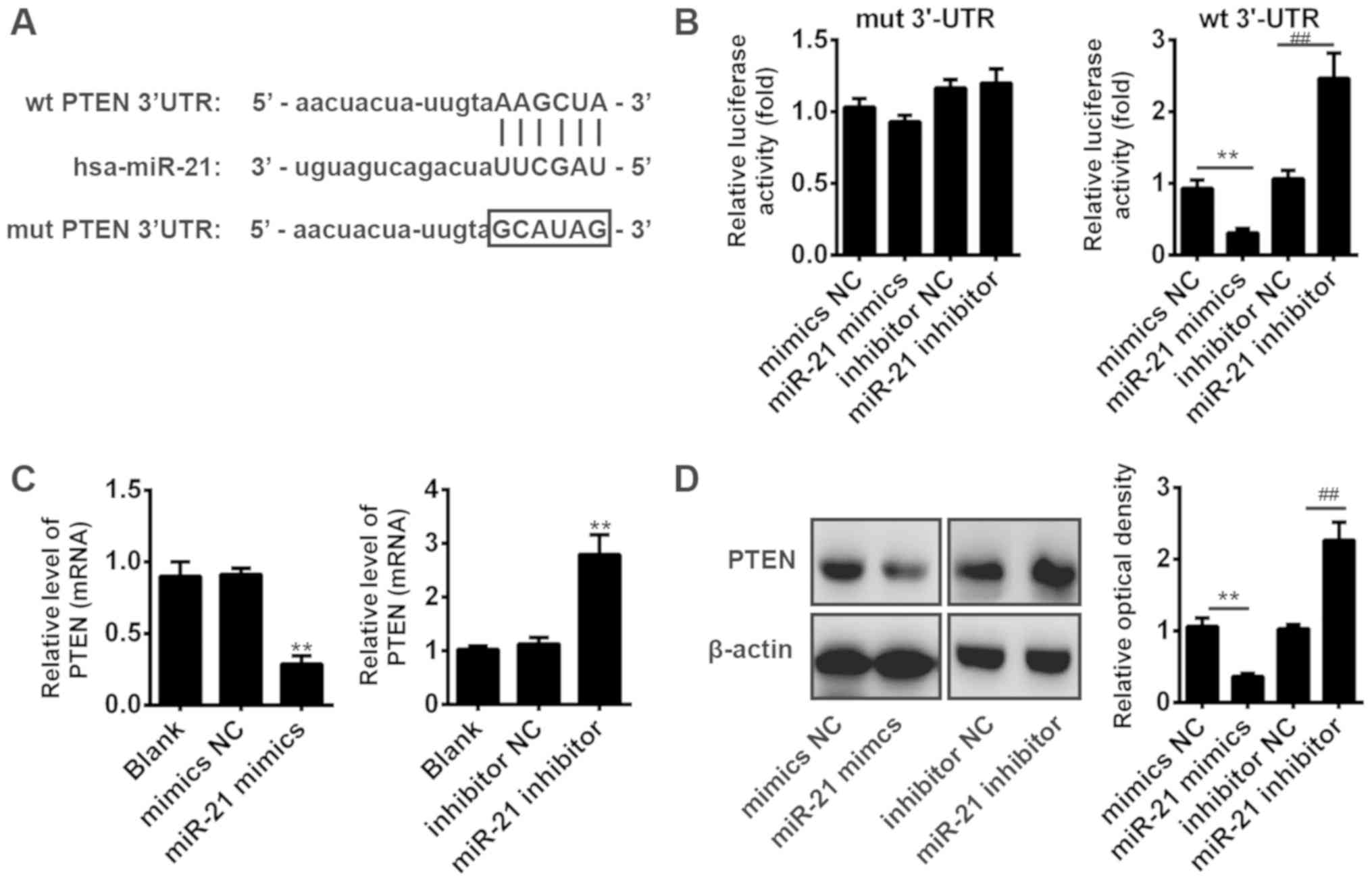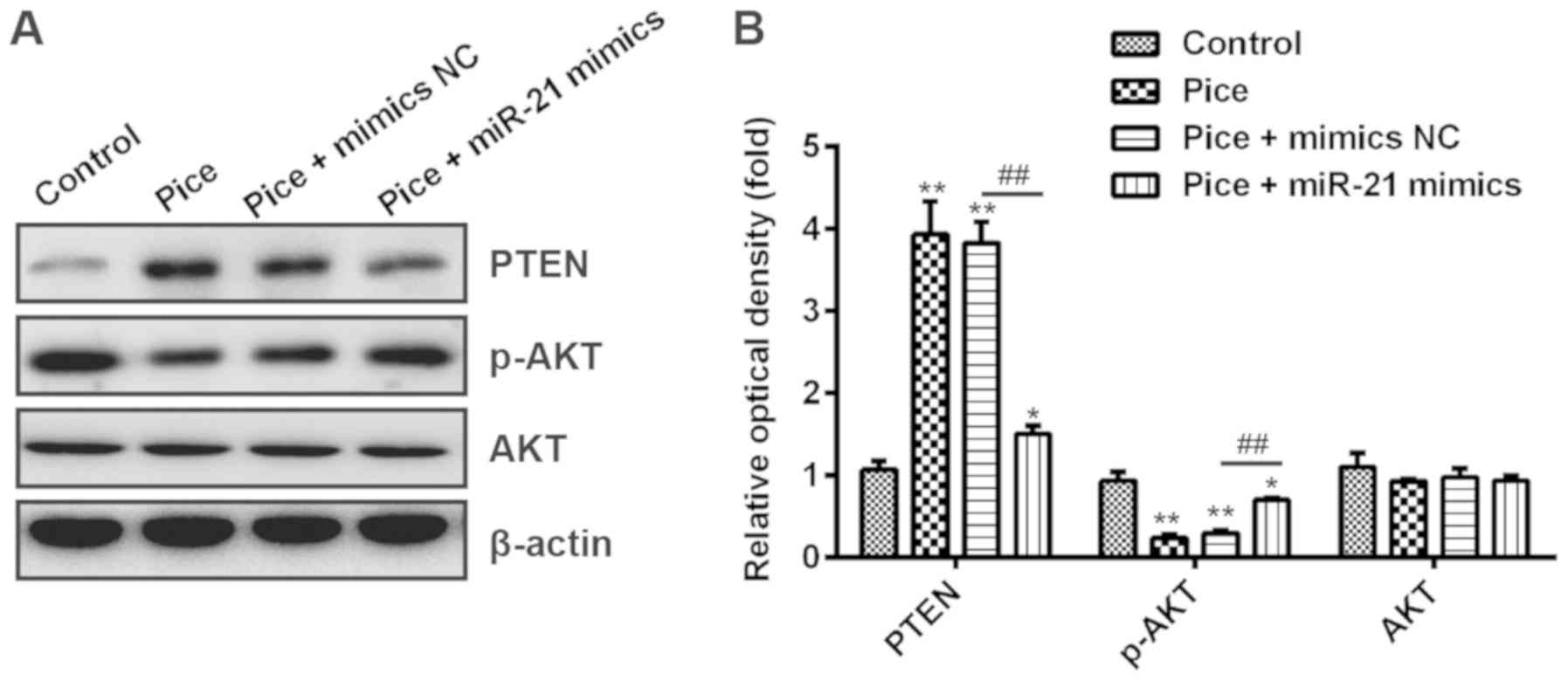|
1
|
Ottaviani G and Jaffe N: The Epidemiology
of Osteosarcoma. Pediatric and Adolescent Osteosarcoma. Jaffe N,
Bruland OS and Bielack S: Springer US; Boston, MA: pp. 3–13.
2010
|
|
2
|
Wang H, Tang M, Ou L, Hou M, Feng T, Huang
YE, Jin Y, Zhang H and Zuo G: Biological analysis of cancer
specific microRNAs on function modeling in osteosarcoma. Sci Rep.
7:53822017. View Article : Google Scholar : PubMed/NCBI
|
|
3
|
Bielack SS, Marina N, Ferrari S, Helman
LJ, Smeland S, Whelan JS and Reaman GH: Osteosarcoma: The same old
drugs or more? J Clin Oncol. 26:3102–3103; author reply 3104–3105.
2008. View Article : Google Scholar : PubMed/NCBI
|
|
4
|
Epis MR, Giles KM, Beveridge DJ,
Richardson KL, Candy PA, Stuart LM, Bentel J, Cohen RJ and Leedman
PJ: miR-331-3p and Aurora Kinase inhibitor II co-treatment
suppresses prostate cancer tumorigenesis and progression.
Oncotarget. 8:55116–55134. 2017. View Article : Google Scholar : PubMed/NCBI
|
|
5
|
Longhi A, Errani C, De Paolis M, Mercuri M
and Bacci G: Primary bone osteosarcoma in the pediatric age: State
of the art. Cancer Treat Rev. 32:423–436. 2006. View Article : Google Scholar : PubMed/NCBI
|
|
6
|
Marina N, Gebhardt M, Teot L and Gorlick
R: Biology and therapeutic advances for pediatric osteosarcoma.
Oncologist. 9:422–441. 2004. View Article : Google Scholar : PubMed/NCBI
|
|
7
|
Li Z, Yang X, Dong S and Li X: DNA
breakage induced by piceatannol and copper(II): Mechanism and
anticancer properties. Oncol Lett. 3:1087–1094. 2012. View Article : Google Scholar : PubMed/NCBI
|
|
8
|
Cantos E, Espín JC, Fernández MJ, Oliva J
and Tomás-Barberán FA: Postharvest UV-C-irradiated grapes as a
potential source for producing stilbene-enriched red wines. J Agric
Food Chem. 51:1208–1214. 2003. View Article : Google Scholar : PubMed/NCBI
|
|
9
|
Matsuda H, Tomohiro N, Hiraba K, Harima S,
Ko S, Matsuo K, Yoshikawa M and Kubo M: Study on anti-Oketsu
activity of rhubarb II. Anti-allergic effects of stilbene
components from Rhei undulati Rhizoma (dried rhizome of Rheum
undulatum cultivated in Korea). Biol Pharm Bull. 24:264–267. 2001.
View Article : Google Scholar : PubMed/NCBI
|
|
10
|
Rimando AM, Kalt W, Magee JB, Dewey J and
Ballington JR: Resveratrol, pterostilbene, and piceatannol in
vaccinium berries. J Agric Food Chem. 52:4713–4719. 2004.
View Article : Google Scholar : PubMed/NCBI
|
|
11
|
Kim YH, Kwon H-S, Kim DH, Cho HJ, Lee HS,
Jun JG, Park JH and Kim JK: Piceatannol, a stilbene present in
grapes, attenuates dextran sulfate sodium-induced colitis. Int
Immunopharmacol. 8:1695–1702. 2008. View Article : Google Scholar : PubMed/NCBI
|
|
12
|
Jin CY, Moon DO, Lee KJ, Kim MO, Lee JD,
Choi YH, Park YM and Kim GY: Piceatannol attenuates
lipopolysaccharide-induced NF-kappaB activation and
NF-kappaB-related proinflammatory mediators in BV2 microglia.
Pharmacol Res. 54:461–467. 2006. View Article : Google Scholar : PubMed/NCBI
|
|
13
|
Song NR, Hwang MK, Heo YS, Lee KW and Lee
HJ: Piceatannol suppresses the metastatic potential of MCF10A human
breast epithelial cells harboring mutated H-ras by inhibiting MMP-2
expression. Int J Mol Med. 32:775–784. 2013. View Article : Google Scholar : PubMed/NCBI
|
|
14
|
Jayasooriya RGPT, Lee YG, Kang CH, Lee KT,
Choi YH, Park SY, Hwang JK and Kim GY: Piceatannol inhibits
MMP-9-dependent invasion of tumor necrosis factor-α-stimulated
DU145 cells by suppressing the Akt-mediated nuclear factor-κB
pathway. Oncol Lett. 5:341–347. 2013. View Article : Google Scholar : PubMed/NCBI
|
|
15
|
Kuo PL and Hsu YL: The grape and wine
constituent piceatannol inhibits proliferation of human bladder
cancer cells via blocking cell cycle progression and inducing
Fas/membrane bound Fas ligand-mediated apoptotic pathway. Mol Nutr
Food Res. 52:408–418. 2008. View Article : Google Scholar : PubMed/NCBI
|
|
16
|
Croce CM: Causes and consequences of
microRNA dysregulation in cancer. Nat Rev Genet. 10:704–714. 2009.
View Article : Google Scholar : PubMed/NCBI
|
|
17
|
Bartel DP: MicroRNAs: Target recognition
and regulatory functions. Cell. 136:215–233. 2009. View Article : Google Scholar : PubMed/NCBI
|
|
18
|
Zhao JJ, Yang J, Lin J, Yao N, Zhu Y,
Zheng J, Xu J, Cheng JQ, Lin JY and Ma X: Identification of miRNAs
associated with tumorigenesis of retinoblastoma by miRNA microarray
analysis. Childs Nerv Syst. 25:13–20. 2009. View Article : Google Scholar : PubMed/NCBI
|
|
19
|
Zhuang LK, Xu GP, Pan XR, Lou YJ, Zou QP,
Xia D, Yan WW, Zhang YT, Jia PM and Tong JH: MicroRNA-181a-mediated
downregulation of AC9 protein decreases intracellular cAMP level
and inhibits ATRA-induced APL cell differentiation. Cell Death Dis.
5:e11612014. View Article : Google Scholar : PubMed/NCBI
|
|
20
|
Zhang B, Pan X, Cobb GP and Anderson TA:
MicroRNAs as oncogenes and tumor suppressors. Dev Biol. 302:1–12.
2007. View Article : Google Scholar : PubMed/NCBI
|
|
21
|
Zamani M, Sadeghizadeh M, Behmanesh M and
Najafi F: Dendrosomal curcumin increases expression of the long
non-coding RNA gene MEG3 via up-regulation of epi-miRs in
hepatocellular cancer. Phytomedicine. 22:961–967. 2015. View Article : Google Scholar : PubMed/NCBI
|
|
22
|
Liu S, Fang Y, Shen H, Xu W and Li H:
Berberine sensitizes ovarian cancer cells to cisplatin through
miR-21/PDCD4 axis. Acta Biochim Biophys Sin (Shanghai). 45:756–762.
2013. View Article : Google Scholar : PubMed/NCBI
|
|
23
|
Hong M, Wang N, Tan YH, Tsao S-W and Feng
Y: MicroRNAs and Chinese Medicinal Herbs: New Possibilities in
Cancer Therapy. Cancers (Basel). 7:1643–1657. 2015. View Article : Google Scholar : PubMed/NCBI
|
|
24
|
Zhang H, Jia R, Wang C, Hu T and Wang F:
Piceatannol promotes apoptosis via up-regulation of microRNA-129
expression in colorectal cancer cell lines. Biochem Biophys Res
Commun. 452:775–781. 2014. View Article : Google Scholar : PubMed/NCBI
|
|
25
|
Livak KJ and Schmittgen TD: Analysis of
relative gene expression data using real-time quantitative PCR and
the 2(−ΔΔC(T)) Method. Methods. 25:402–408. 2001. View Article : Google Scholar : PubMed/NCBI
|
|
26
|
Bartel DP: MicroRNAs: Genomics,
biogenesis, mechanism, and function. Cell. 116:281–297. 2004.
View Article : Google Scholar : PubMed/NCBI
|
|
27
|
le Sage C and Agami R: Immense promises
for tiny molecules: Uncovering miRNA functions. Cell Cycle.
5:1415–1421. 2006. View Article : Google Scholar : PubMed/NCBI
|
|
28
|
Ren X, Shen Y, Zheng S, Liu J and Jiang X:
miR-21 predicts poor prognosis in patients with osteosarcoma. Br J
Biomed Sci. 73:158–162. 2016. View Article : Google Scholar : PubMed/NCBI
|
|
29
|
Lv C, Hao Y and Tu G: MicroRNA-21 promotes
proliferation, invasion and suppresses apoptosis in human
osteosarcoma line MG63 through PTEN/Akt pathway. Tumour Biol.
37:9333–9342. 2016. View Article : Google Scholar : PubMed/NCBI
|
|
30
|
Ziyan W, Shuhua Y, Xiufang W and Xiaoyun
L: MicroRNA-21 is involved in osteosarcoma cell invasion and
migration. Med Oncol. 28:1469–1474. 2011. View Article : Google Scholar : PubMed/NCBI
|
|
31
|
Liu ZL, Wang H, Liu J and Wang ZX:
MicroRNA-21 (miR-21) expression promotes growth, metastasis, and
chemo- or radioresistance in non-small cell lung cancer cells by
targeting PTEN. Mol Cell Biochem. 372:35–45. 2013. View Article : Google Scholar : PubMed/NCBI
|
|
32
|
Zhuang LK, Yang YT, Ma X, Han B, Wang ZS,
Zhao QY, Wu LQ and Qu ZQ: MicroRNA-92b promotes hepatocellular
carcinoma progression by targeting Smad7 and is mediated by long
non-coding RNA XIST. Cell Death Dis. 7:e22032016. View Article : Google Scholar : PubMed/NCBI
|
|
33
|
Xu LF, Wu ZP, Chen Y, Zhu QS, Hamidi S and
Navab R: MicroRNA-21 (miR-21) regulates cellular proliferation,
invasion, migration, and apoptosis by targeting PTEN, RECK and
Bcl-2 in lung squamous carcinoma, Gejiu City, China. PLoS One.
9:e1036982014. View Article : Google Scholar : PubMed/NCBI
|
|
34
|
Guo H, German P, Bai S, Barnes S, Guo W,
Qi X, Lou H, Liang J, Jonasch E, Mills GB, et al: The PI3K/AKT
Pathway and Renal Cell Carcinoma. J Genet Genomics. 42:343–353.
2015. View Article : Google Scholar : PubMed/NCBI
|
|
35
|
Nakanishi A, Wada Y, Kitagishi Y and
Matsuda S: Link between PI3K/AKT/PTEN Pathway and NOX Proteinin
Diseases. Aging Dis. 5:203–211. 2014. View Article : Google Scholar : PubMed/NCBI
|
|
36
|
Wu YR, Qi HJ, Deng DF, Luo YY and Yang SL:
MicroRNA-21 promotes cell proliferation, migration, and resistance
to apoptosis through PTEN/PI3K/AKT signaling pathway in esophageal
cancer. Tumour Biol. 37:12061–12070. 2016. View Article : Google Scholar : PubMed/NCBI
|
|
37
|
Tsunoda T, Ishikura S, Doi K, Matsuzaki H,
Iwaihara Y and Shirasawa S: Resveratrol induces luminal apoptosis
of human colorectal cancer HCT116 cells in three-dimensional
culture. Anticancer Res. 34:4551–4555. 2014.PubMed/NCBI
|
|
38
|
Fu Y, Chang H, Peng X, Bai Q, Yi L, Zhou
Y, Zhu J and Mi M: Resveratrol inhibits breast cancer stem-like
cells and induces autophagy via suppressing Wnt/β-catenin signaling
pathway. PLoS One. 9:e1025352014. View Article : Google Scholar : PubMed/NCBI
|
|
39
|
Larrosa M, Tomás-Barberán FA and Espín JC:
The grape and wine polyphenol piceatannol is a potent inducer of
apoptosis in human SK-Mel-28 melanoma cells. Eur J Nutr.
43:275–284. 2004. View Article : Google Scholar : PubMed/NCBI
|
|
40
|
Liu WH and Chang LS: Suppression of
Akt/Foxp3-mediated miR-183 expression blocks Sp1-mediated ADAM17
expression and TNFα-mediated NFκB activation in piceatannol-treated
human leukemia U937 cells. Biochem Pharmacol. 84:670–680. 2012.
View Article : Google Scholar : PubMed/NCBI
|
|
41
|
Kang CH, Moon DO, Choi YH, Choi IW, Moon
SK, Kim WJ and Kim GY: Piceatannol enhances TRAIL-induced apoptosis
in human leukemia THP-1 cells through Sp1- and ERK-dependent DR5
up-regulation. Toxicol In Vitro. 25:605–612. 2011. View Article : Google Scholar : PubMed/NCBI
|
|
42
|
Lee RC, Feinbaum RL and Ambros V: The C.
elegans heterochronic gene lin-4 encodes small RNAs with antisense
complementarity to lin-14. Cell. 75:843–854. 1993. View Article : Google Scholar : PubMed/NCBI
|
|
43
|
Wu QB, Chen J, Zhu JW, Yin X, You HY, Lin
YR and Zhu HQ: MicroRNA 125 inhibits RKO colorectal cancer cell
growth by targeting VEGF. Int J Mol Med. 42:665–673.
2018.PubMed/NCBI
|
|
44
|
Zhang J, Yan YG, Wang C, Zhang SJ, Yu XH
and Wang WJ: MicroRNAs in osteosarcoma. Clin Chim Acta. 444:9–17.
2015. View Article : Google Scholar : PubMed/NCBI
|
|
45
|
Kumar A, Rimando AM and Levenson AS:
Resveratrol and pterostilbene as a microRNA-mediated
chemopreventive and therapeutic strategy in prostate cancer. Ann N
Y Acad Sci. 1403:15–26. 2017. View Article : Google Scholar : PubMed/NCBI
|
|
46
|
Ke K, Sul OJ, Rajasekaran M and Choi HS:
MicroRNA-183 increases osteoclastogenesis by repressing heme
oxygenase-1. Bone. 81:237–246. 2015. View Article : Google Scholar : PubMed/NCBI
|
|
47
|
Lu J, Song G, Tang Q, Yin J, Zou C, Zhao
Z, Xie X, Xu H, Huang G, Wang J, et al: miR-26a inhibits stem
cell-like phenotype and tumor growth of osteosarcoma by targeting
Jagged1. Oncogene. 36:231–241. 2017. View Article : Google Scholar : PubMed/NCBI
|
|
48
|
Cheng D, Qiu X, Zhuang M, Zhu C, Zou H and
Liu Z: MicroRNAs with prognostic significance in osteosarcoma: A
systemic review and meta-analysis. Oncotarget. 8:81062–81074. 2017.
View Article : Google Scholar : PubMed/NCBI
|
|
49
|
Song MS, Salmena L and Pandolfi PP: The
functions and regulation of the PTEN tumour suppressor. Nat Rev Mol
Cell Biol. 13:283–296. 2012. View Article : Google Scholar : PubMed/NCBI
|
|
50
|
Butler MS, Robertson AAB and Cooper MA:
Natural product and natural product derived drugs in clinical
trials. Nat Prod Rep. 31:1612–1661. 2014. View Article : Google Scholar : PubMed/NCBI
|
|
51
|
Pan M-H, Ghai G and Ho CT: Food
bioactives, apoptosis, and cancer. Mol Nutr Food Res. 52:43–52.
2008. View Article : Google Scholar : PubMed/NCBI
|
|
52
|
Aravindaram K and Yang NS:
Anti-inflammatory plant natural products for cancer therapy. Planta
Med. 76:1103–1117. 2010. View Article : Google Scholar : PubMed/NCBI
|
|
53
|
Tosetti F, Noonan DM and Albini A:
Metabolic regulation and redox activity as mechanisms for
angioprevention by dietary phytochemicals. Int J Cancer.
125:1997–2003. 2009. View Article : Google Scholar : PubMed/NCBI
|
|
54
|
Shammas MA, Koley H, Batchu RB, Neri P,
Tassone P, Prabhala R, Anderson KC and Munshi NC: Specific Killing
of Multiple Myeloma Cancer Cells by Epigallocatechin-3-Gallate
Extracted from Green Tea. Blood. 104:24612004. View Article : Google Scholar
|
|
55
|
Kwon KH, Barve A, Yu S, Huang MT and Kong
ANT: Cancer chemoprevention by phytochemicals: Potential molecular
targets, biomarkers and animal models. Acta Pharmacol Sin.
28:1409–1421. 2007. View Article : Google Scholar : PubMed/NCBI
|
|
56
|
Singh RP, Tyagi A, Sharma G, Mohan S and
Agarwal R: Oral silibinin inhibits in vivo human bladder tumor
xenograft growth involving down-regulation of survivin. Clin Cancer
Res. 14:300–308. 2008. View Article : Google Scholar : PubMed/NCBI
|
|
57
|
Ku KL, Chang PS, Cheng YC and Lien CY:
Production of stilbenoids from the callus of Arachis hypogaea: A
novel source of the anticancer compound piceatannol. J Agric Food
Chem. 53:3877–3881. 2005. View Article : Google Scholar : PubMed/NCBI
|
|
58
|
Chen XR, Lu R, Dan HX, Liao G, Zhou M, Li
XY and Ji N: Honokiol: A promising small molecular weight natural
agent for the growth inhibition of oral squamous cell carcinoma
cells. Int J Oral Sci. 3:34–42. 2011. View Article : Google Scholar : PubMed/NCBI
|
|
59
|
Yang J, Zou Y and Jiang D: Honokiol
suppresses proliferation and induces apoptosis via regulation of
the miR 21/PTEN/PI3K/AKT signaling pathway in human osteosarcoma
cells. Int J Mol Med. 41:1845–1854. 2018.PubMed/NCBI
|















